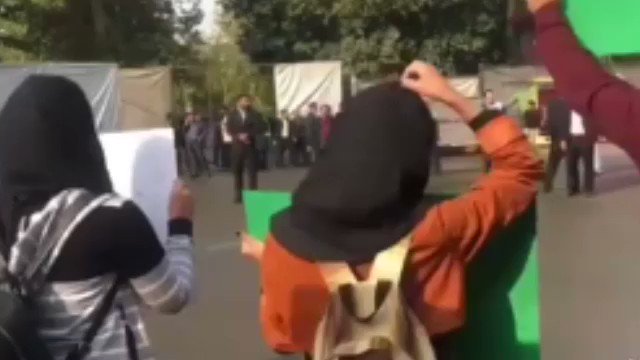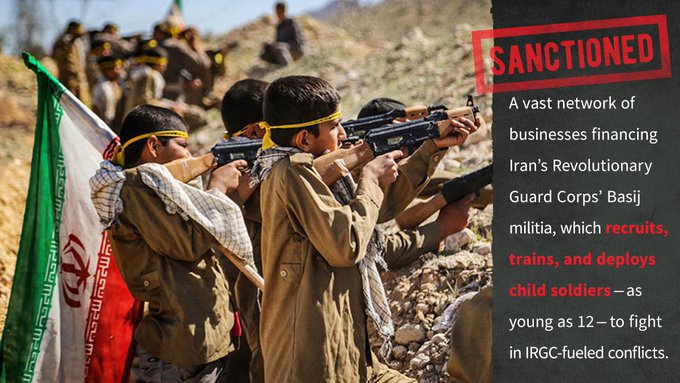Reported by PMOI/MEK
Oct. 20, 2018 - Ten senior members of the European Parliament have issued a statement covering the Iranian regime’s terrorist plots and demonizing campaign targeting the Iranian opposition People's Mojahedin Organization of Iran (PMOI/MEK), especially their members in Albania.
This statement calls on the European Union to blacklist the Iranian regime’s Ministry of Intelligence and Security (MOIS) for its undeniable role in Tehran’s terrorism. According to an EU statement issued back in April 1997, “’visas [should] not be granted to Iranians with intelligence and security functions’ and ‘Iranian intelligence personnel from European Union Member States should be expelled.’”
The Iranian regime’s agents, active mainly under the disguise of reporters, are considered a general threats for the PMOI/MEK in Albania. The most urgent step necessary to protect these “refugees” is for the Albanian government to expel these intelligence agents of Tehran’s regime. Experience shows the security of the host country is jeopordized when Iranian regime spies and operatives are tolerated.
Full statement:
We are concerned about the Iranian regime’s terrorist plans against its main opposition. They include plots to blow up the Persian New Year gathering of Iranian refugees, members of the PMOI/MEK, in Tirana in March 2018, and the Free Iran Grand Gathering in Paris on June 30, 2018, as well as an intelligence-gathering operation against PMOI members in the U.S. by two agents of Iran’s Ministry of Intelligence and Security (MOIS) arrested in August 2018.
By plotting to blow up the Paris gathering attended by some 100,000 people as well as hundreds of European and U.S. dignitaries, including several members of the European Parliament, the regime crossed all red lines. An Iranian diplomat in Vienna personally handed the explosives to other agents. German police arrested him on 1 July and he was handed over to Belgium on 9 October to face trial. On 2 October, French officials announced that the plot to attack the Paris gathering had been organized by Tehran’s intelligence services. France has seized assets belonging to the Iranian Intelligence Ministry. As such, the efforts by the regime and its lobbies trying to attribute this plot only to rogue elements within the regime to save the so-called “moderates” in the government, failed.
The new wave of terrorism reflects the regime’s inability to deal with a nationwide uprising that began in late 2017 and has continued to date. Tehran blames the PMOI for organizing the protests and strikes. The ongoing strikes in the Tehran Bazaar and many other cities as well as the continuing strike by hundreds of thousands of truck drivers, are the latest in the series of protests.
Coupled with crackdown at home and terrorism abroad, the Iranian regime has stepped up its sinister campaign of demonization against the Iranian opposition by using the services of its operatives, who have infiltrated several western media outlets. The aim is to portray the opposition as an insular and dangerous sect, which would be worse than the current regime if it were to assume power in Iran.
Iranian dissidents in Albania are the primary focus of this demonization campaign. The regime is furious over the safe and secure relocation all PMOI members to Albania as it failed to annihilate them in Iraq or force them to surrender and return to Iran. By concocting absurd lies such as claiming that the PMOI has set up a government within a government or that it is holding its members against their will, Tehran is clearly setting the stage for further terrorist actions against them.
We are fully aware of the falsity of these claims, disseminated in a well-orchestrated and simultaneous chorus in some media outlets.
Since 2005 several European Parliament delegations travelled to Camp Ashraf, Iraq, privately met with Ashraf residents and published their own reports on the visits. Some of us have also visited the new PMOI site in Albania and have met its members personally.
Our two-decade-long experience with this opposition makes it clear that this movement is a genuinely democratic, responsible and reliable movement, whose only aim is to establish democracy and human
rights in Iran. It deeply respects the people and laws of Albania and has forged amicable relations with the host nation. As acknowledged by Albanian leaders, by accepting these refugees, Albania has found a new standing within the European Union and around the world. The members of the PMOI are working to free their homeland voluntarily and freely. No one is being kept in Albania against his/her own will.
Back in 2004 at the European Parliament, Iranian opposition leader Maryam Rajavi, declared that the only solution regarding the Iranian problem is a changing of the regime by the Iranian people and the Resistance. She has called on the international community to end the policy of appeasement and to adopt a firm policy vis-à-vis the regime. We have endorsed Mrs. Rajavi’s ten-point-plan for the future free Iran, which coupled with this movement’s proven commitment to democratic principles gives us enormous hope about the future.
Accordingly, we underscore the following:
1. Given its undisputed role in terrorism, the Iranian Intelligence Ministry should be placed on the European Union’s terrorism list and the U.S.’s Foreign Terrorist Organizations list.
2. Consistent with the Council of European Union ratification in April 1997, “visas [should] not be granted to Iranians with intelligence and security functions" and "Iranian intelligence personnel from European Union Member States should be expelled.”
3. The regime’s agents pose a major threat to Iranian dissidents in Albania. These agents work under various pretexts, especially as journalists. The most urgent step in protecting these refugees is to expel Tehran’s intelligence operatives by the Albanian Government. Experience has shown that when the spies and agents of Iran are tolerated, the host countries’ security would be jeopardized.
Signatories:
Tunne Kelam, Member of European Parliament from Estonia
Eduard Kukan, MEP, Former Minister of Foreign Affairs of Slovakia
Jozo Radoš, MEP, Former Minister of Defence of Croatia
Heinz Becker, Member of European Parliament from Austria
José Bové, Member of European Parliament from France
Julie Ward, Member of European Parliament from UK Labour Party
Anthea McIntyre, MEP, Vice Chair of UK Conservative Party
Petri Sarvamaa, Member of European Parliament from Finland
Ryszard Czarnecki, MEP, former Minister of Europe of Poland
Jan Zahradil, Member of European Parliament from Czech Republic







